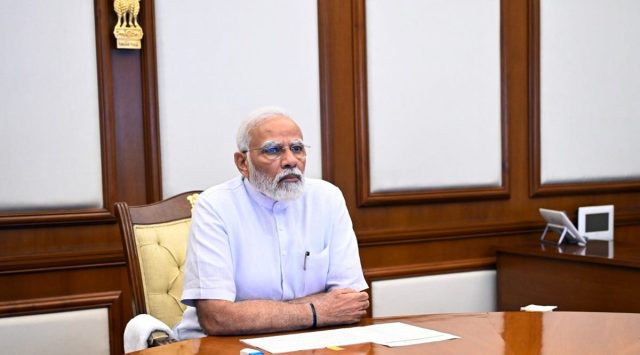PRIME MINISTER Narendra Modi directed officials on Wednesday to enhance whole genome sequencing of the Covid-19 virus to track newer variants and carry out effective monitoring of influenza-like illnesses and severe acute respiratory infections. He also urged people to follow respiratory hygiene and Covid-19 appropriate behaviour, according to a statement issued by the PMO.

The meeting was attended by Principal Secretary P K Mishra, NITI Aayog member V K Paul, Cabinet Secretary Rajiv Gauba, Indian Council of Medical Research (ICMR) DG Rajiv Bahl and PMO Advisor Amit Khare.
Story continues below this ad
The meeting comes in the backdrop of increasing Covid-19 cases over the past three weeks. An increase in flu cases, especially of H3N2 subtype, has also been seen during this period.
ExplainedKeeping a close watch
FOLLOWING THE devastating second wave that took India by surprise, the government has kept a regular watch on Covid cases. An early warning, when the cases are just on the rise, helps local bodies implement measures to prevent further spread. Whole genome-based surveillance also helps keep an eye.
According to data shared by the Union Health Ministry, more than 1,000 new Covid-19 cases daily were reported on two of the previous three days – March 20 (1,246 cases), March 21 (699 cases) and March 22 (1,134 cases).
Till mid-February, less than 1,000 cases were being reported a week. The numbers started rising slowly, reaching 3,000 cases a week by mid-March.
The Prime Minister had last taken a review meeting on Covid-19 in December 2022, when Asian countries such as China, Singapore, Hong Kong, Thailand, and Japan were reporting an increase in cases. A mock drill was also conducted thereafter to check the preparedness across 22,000 hospitals.
In view of the increasing cases and positivity rate, the Centre last week wrote to six states – Tamil Nadu, Telangana, Kerala, Karnataka, Maharashtra, and Gujarat – asking them to conduct adequate and proactive testing, monitor new and emerging clusters of infections, keep an eye on the influenza-like illnesses coming to health facilities, and send samples of international travellers, sentinel sites, and clusters for genomic sequencing.
Story continues below this ad
The letter also urged the states to take measures to promote precaution doses and ensure people follow Covid-19 appropriate behaviour.
Dr Suranjit Chatterjee, senior consultant of internal medicine at Indraprastha Apollo Hospital, said there has been an increase in Covid-19 cases in his clinic over the past 10-12 days. In the same period, he said, they received an increasing number of tele-consultation requests for the same from both Delhi and Mumbai.
“Most of the people are coming in with flu-like symptoms – fever, headache, body ache – very similar to what we were seeing with flu cases two weeks ago. However, their tests are now coming back positive for Covid-19,” he said.
Two weeks ago, the Centre had held a review meeting in view of increasing number of flu cases, especially due to the sub-type H3N2.
Story continues below this ad
Data from the ICMR – which tracks respiratory infections across its network of viral laboratories – shows that Covid-19 is on the rise. In the first week of March, two of the flu sub-types were found in 81.6% of respiratory samples, while Covid-19 was found in 12.6%. By March second week, flu sub-types were found in 48% of the samples and Covid-19 in 33.3% samples.
Along with the increasing cases of Covid-19, a newer sub-variant of the recombinant variant XBB was reported from Maharashtra and Gujarat. There were 40 sequences of XBB1.16 isolated from samples from Maharashtra and 26 sequences from Gujarat.









